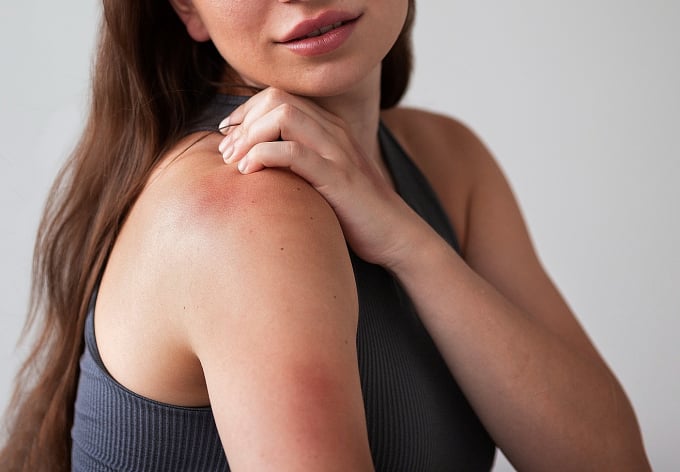Itching on the skin, which can occur on the face, is a sign of sunburn, excessively dry skin, or eczema and psoriasis.
Itchy skin is not only uncomfortable but can also damage the skin, and can be caused by many factors. Below are some skin conditions that manifest as itching and how to treat them.
Dry skin
Dry skin is rough, flaky, and itchy, but does not cause a rash. This condition can occur anywhere on the body, but skin on the face is drier and itchier in cold, dry weather.
To remedy this, use a gentle cleanser and moisturizer containing ceramides. This substance helps strengthen and restore the skin's protective barrier, thereby preventing transepidermal water loss.
Eczema
Eczema is a chronic, non-contagious skin disease associated with genetic factors, individual predisposition, and contact substances. The disease causes dry, red, and itchy skin lesions. There are many types of eczema, such as nummular eczema, contact eczema, and atopic eczema, which can appear in episodes, be persistent, or recur.
Regular moisturizing is recommended to keep the skin hydrated. Patients should consult a doctor for prescribed medication to control symptoms.
Seborrheic dermatitis
Seborrheic dermatitis occurs in oily areas of the skin such as the T-zone (sides of the nose, forehead), behind the ears, eyebrows, neck, and chest. Symptoms include reddish-pink rashes with scaly, sticky, greasy skin and itching. According to the American Academy of Dermatology (AAD), anyone can be affected, but it is more common in people over 50, especially men and those with darker skin.
Doctors prescribe topical medications to reduce skin damage. If the inflammation is severe and widespread, oral medication may be prescribed. In severe, prolonged cases where medication is ineffective, doctors may use light therapy to clear scales and improve skin condition.
Contact dermatitis
If itchy skin accompanied by a red rash appears after using a new facial cleanser, soap, lotion, or cosmetic product, it may be contact dermatitis. The condition usually clears up within a few days to a few weeks by avoiding the irritant. During this time, the patient can apply a cold compress for 10-15 minutes at a time to reduce itching or use a moisturizer.

Itchy skin can cause redness and abrasions when scratched. Photo: Freepik
Sunburn
Sunburns on the face are uncomfortable and itchy. This is because the red, swollen, hot, and painful patches can affect surface nerve fibers, sending itch signals to the brain. Severe sunburns may also cause peeling or blistering.
Remedies include keeping the skin cool and hydrated. You can apply a damp cloth to your face for 10 minutes, then apply a moisturizer or gel containing aloe vera or soy.
Psoriasis
According to the Psoriasis Foundation of America, psoriasis commonly appears around the ears, mouth, or eyes. These patches of skin tend to be dry, itchy, and often flare up in response to triggers such as infections, cold weather, or skin injuries.
Mild symptoms can be controlled with ointments or creams such as corticosteroids, vitamin D, or retinol. Patients with severe symptoms should see a doctor for appropriate medication.
Other causes
Sometimes itching on the face or other parts of the body can be caused by taking new medications such as aspirin, blood pressure medication, painkillers, or by radiation therapy for cancer. When skin itching is due to medication, patients should discuss this with their doctor to find a suitable solution.
In some cases, itching can be caused by anemia, diabetes, liver or kidney disease, multiple sclerosis, or shingles. Itching in moles can be a sign of skin cancer.
Huyen My (According to Livestrong )
| Readers can submit their dermatological questions here for the doctor to answer. |
Source link



![[Photo] Prime Minister Pham Minh Chinh receives the Governor of Tochigi Province (Japan)](/_next/image?url=https%3A%2F%2Fvphoto.vietnam.vn%2Fthumb%2F1200x675%2Fvietnam%2Fresource%2FIMAGE%2F2025%2F12%2F16%2F1765892133176_dsc-8082-6425-jpg.webp&w=3840&q=75)
![[Photo] Prime Minister Pham Minh Chinh receives Lao Minister of Education and Sports Thongsalith Mangnormek](/_next/image?url=https%3A%2F%2Fvphoto.vietnam.vn%2Fthumb%2F1200x675%2Fvietnam%2Fresource%2FIMAGE%2F2025%2F12%2F16%2F1765876834721_dsc-7519-jpg.webp&w=3840&q=75)

![[Live] 2025 Community Action Awards Gala](/_next/image?url=https%3A%2F%2Fvphoto.vietnam.vn%2Fthumb%2F1200x675%2Fvietnam%2Fresource%2FIMAGE%2F2025%2F12%2F16%2F1765899631650_ndo_tr_z7334013144784-9f9fe10a6d63584c85aff40f2957c250-jpg.webp&w=3840&q=75)
![[Image] Leaked images ahead of the 2025 Community Action Awards gala.](/_next/image?url=https%3A%2F%2Fvphoto.vietnam.vn%2Fthumb%2F1200x675%2Fvietnam%2Fresource%2FIMAGE%2F2025%2F12%2F16%2F1765882828720_ndo_br_thiet-ke-chua-co-ten-45-png.webp&w=3840&q=75)







































































































Comment (0)